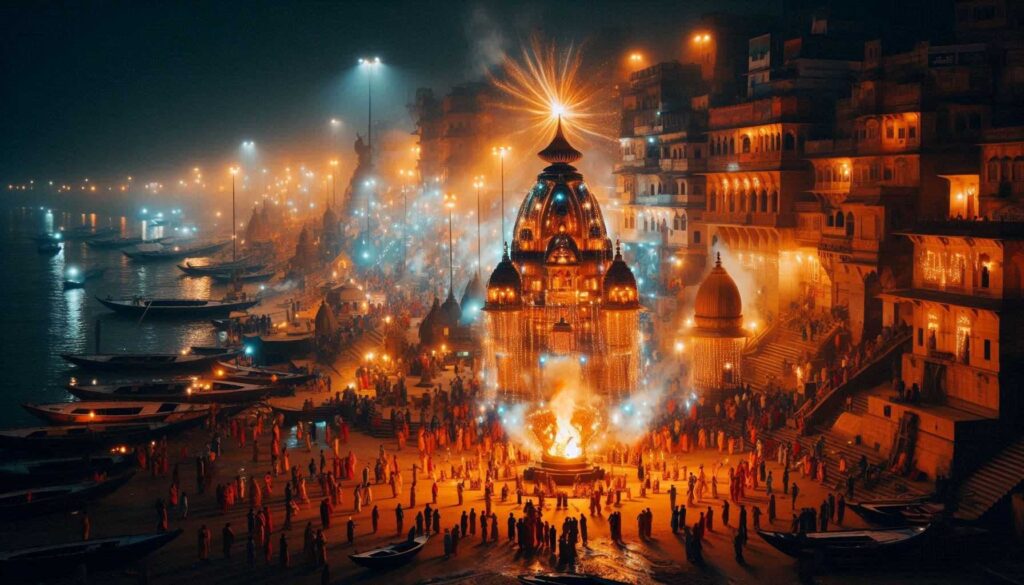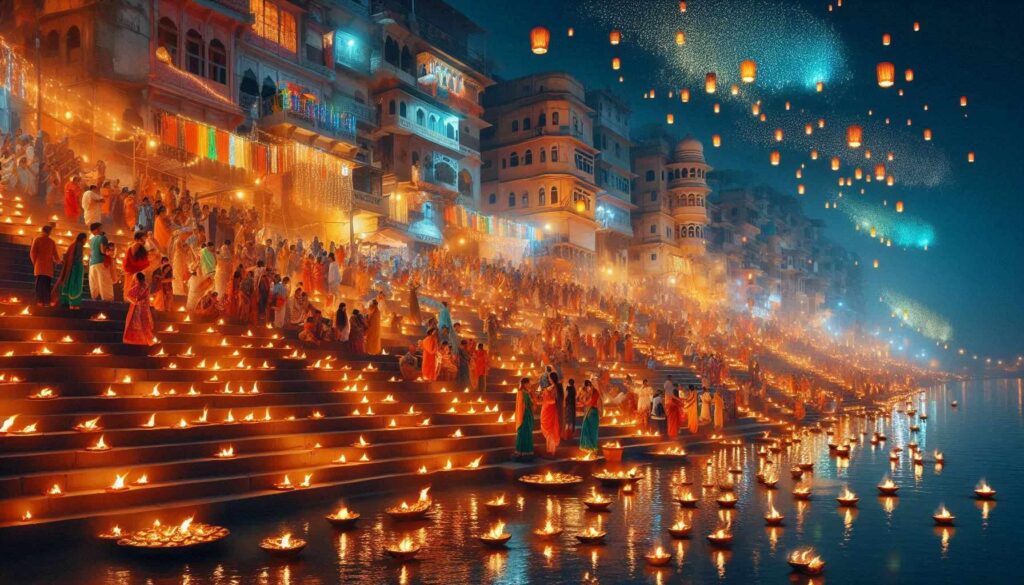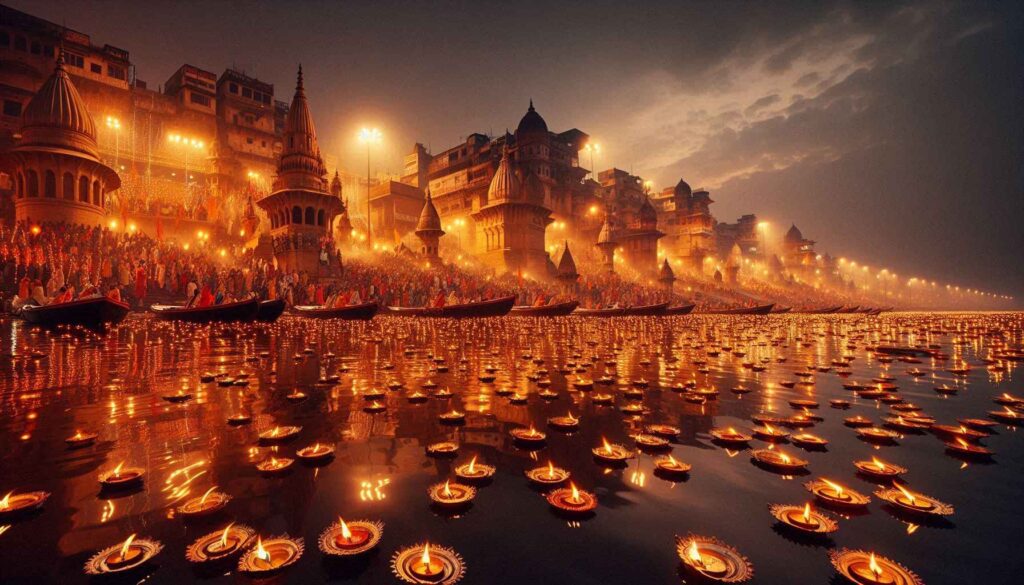Dev Deepavali: A Divine Celebration of Lights in Varanasi

Introduction
Dev Deepavali (or Dev Diwali) is one of the most mesmerizing and spiritually significant festivals in the holy city of Varanasi. Celebrated on Kartik Purnima, 15 days after Diwali, Dev Deepavali marks the occasion when, according to Hindu belief, the gods descend from heaven to the sacred Ghats of Varanasi. This festival is known for its breathtaking visual spectacle, as millions of lamps illuminate the banks of the Ganges River, creating an atmosphere of celestial beauty.
Unlike Diwali, which is celebrated all over India, Dev Deepavali is uniquely associated with Varanasi. The festival honors the gods and is a time for paying homage to ancestors, performing religious rituals, and partaking in cultural activities. As the city of Varanasi is regarded as the spiritual heart of Hinduism, the celebration of Dev Deepavali here holds special significance.
In this article, we will explore the history, mythology, rituals, and cultural importance of Dev Deepavali, and understand why it is one of the most awaited festivals in Varanasi.
Read More About Hindu Philosophyhttps://hinduvism.com/diwali/
The Mythological Significance of Dev Deepavali

The mythology surrounding Dev Deepavali is rooted in ancient Hindu scriptures and is closely linked with Lord Shiva and Lord Vishnu. It is believed that on Kartik Purnima, the gods come down to earth to bathe in the sacred waters of the Ganges and celebrate the victory of good over evil.
- Victory of Lord Shiva: One of the key legends associated with Dev Deepavali is the destruction of the demon Tripurasura by Lord Shiva. According to the myth, Tripurasura was a powerful demon who had gained control over the three worlds (heaven, earth, and the underworld) and terrorized the gods. To save the universe, the gods sought the help of Lord Shiva. On Kartik Purnima, Lord Shiva, in his form as Tripurari, destroyed the demon and restored peace to the cosmos. This victory is commemorated as Dev Deepavali, symbolizing the triumph of light over darkness.
- Lord Vishnu and Kartik Purnima: Kartik Purnima is also associated with Lord Vishnu. It is said that during the month of Kartik, Vishnu resides in the sacred waters of the Ganges, and bathing in the river on this auspicious day grants spiritual purification and blessings. This association adds to the sacredness of Dev Deepavali, as pilgrims and devotees flock to Varanasi to take a holy dip in the Ganges on Kartik Purnima.
The Spectacle of Dev Deepavali in Varanasi

Varanasi, also known as Kashi or Banaras, is regarded as one of the holiest cities in Hinduism. Its association with Lord Shiva and the presence of the Ganges River make it a central hub for religious and spiritual activities. During Dev Deepavali, the city transforms into a celestial realm of lights and devotion.
- Illumination of the Ghats: One of the most awe-inspiring aspects of Dev Deepavali is the lighting of oil lamps (diyas) along the 84 ghats that line the Ganges River. Devotees and pilgrims light millions of diyas in the evening, creating a magical sight as the riverbanks glow with a divine light. The reflection of these lamps on the river surface adds to the ethereal beauty of the festival. This act of lighting lamps symbolizes the victory of good over evil, as well as the presence of the gods in Varanasi.
- Holy Dip in the Ganges: On the morning of Kartik Purnima, thousands of devotees take a holy dip in the Ganges. It is believed that bathing in the river on this auspicious day purifies the soul and washes away sins. Pilgrims from all over India visit Varanasi for this ritual, seeking spiritual purification and blessings from the gods.
- Ganga Aarti: The Ganga Aarti, a grand prayer ceremony dedicated to the Ganges, is a key highlight of Dev Deepavali. Held at the Dashashwamedh Ghat, this aarti is performed by priests who offer prayers with lit lamps, incense, and chants, invoking the blessings of the river goddess and the gods. The Aarti is a deeply spiritual experience for both devotees and tourists alike, as the air fills with the sound of devotional hymns, conch shells, and the rhythmic movements of the priests.
- Processions and Cultural Performances: Dev Deepavali is also marked by various cultural and religious processions. These processions include deity idols being carried through the streets, accompanied by music, dance, and chanting. Classical music and dance performances, storytelling sessions, and kathak recitals are held throughout the city, further enhancing the cultural and spiritual atmosphere of the festival.
Rituals and Traditions of Dev Deepavali
Dev Deepavali is a festival of devotion, and the rituals performed during the festival are designed to seek divine blessings and honor ancestors.
- Puja and Offerings: Devotees perform special pujas (ritual prayers) at temples and at home, offering flowers, incense, sweets, and fruits to the gods. The most important puja of the day is performed at the ghats of the Ganges, where priests lead the prayers, and people offer diyas, flowers, and prayers to the river.
- Ancestor Worship (Pitru Tarpan): A key aspect of Dev Deepavali is the offering of Pitru Tarpan, a ritual to honor and remember ancestors. Devotees perform this ritual by offering water, sesame seeds, and rice to the souls of their departed family members. It is believed that by doing so, the ancestors’ souls find peace, and their blessings are bestowed upon the family.
- Fasting and Charity: Many devotees observe fasting on the day of Kartik Purnima as an act of devotion and self-purification. Offering charity to the poor and needy is also considered a virtuous act during this festival. Donations of food, clothes, and money are made, with the belief that helping others brings divine blessings.
Spiritual and Cultural Significance
Dev Deepavali holds deep spiritual meaning for Hindus, particularly those who revere Varanasi as a city of salvation. The festival celebrates the presence of the divine on earth and symbolizes the victory of light over darkness, good over evil, and knowledge over ignorance.
- The Light of the Gods: The lighting of lamps during Dev Deepavali represents the light of the gods illuminating the world. This act of lighting diyas is a metaphor for dispelling the darkness of ignorance and bringing the light of divine knowledge into our lives. The presence of millions of lamps on the ghats signifies the descent of the gods, who bless the devotees with their divine grace.
- Cleansing of the Soul: Bathing in the Ganges on Kartik Purnima is believed to cleanse the soul of sins and bring spiritual merit. The Ganges is considered the most sacred river in Hinduism, and taking a dip in its waters during Dev Deepavali is seen as a way to attain moksha (spiritual liberation).
- Honoring the Ancestors: The ritual of offering prayers to ancestors reflects the Hindu belief in the continuity of life and the importance of honoring the departed souls. By performing the Pitru Tarpan, devotees express gratitude to their ancestors and seek their blessings for future generations.
- Cultural Unity: Dev Deepavali also brings together people from different walks of life to celebrate the festival’s spiritual and cultural essence. It fosters a sense of unity, as people from across India and even abroad gather in Varanasi to witness the grandeur of this divine festival.
Dev Deepavali in Modern Times
In recent years, Dev Deepavali has gained immense popularity, not just among the devotees but also among tourists and photographers. The sight of millions of lamps glowing along the Ganges has attracted people from around the world. Tourists flock to Varanasi to experience the spiritual atmosphere and capture the beauty of the festival.
Additionally, the government and local authorities have made efforts to preserve the cultural and spiritual significance of Dev Deepavali by promoting it as a major cultural event. The festival now features larger-than-life processions, laser light shows, and other modern elements that appeal to younger generations while retaining its traditional roots.


